|
|
|
Sort Order |
|
|
|
Items / Page
|
|
|
|
|
|
|
| Srl | Item |
| 1 |
ID:
130188
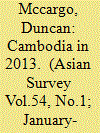

|
|
|
|
|
| Publication |
2014.
|
| Summary/Abstract |
Cambodia in 2013 was dominated by close-fought national elections on July 28, only narrowly won by the ruling Cambodian People's Party after an unexpectedly strong showing by the opposition. Generational change was a major theme of the year, seen in the growing activism of youth and the deaths of several prominent figures.
|
|
|
|
|
|
|
|
|
|
|
|
|
|
|
|
| 2 |
ID:
129193
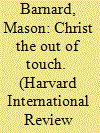

|
|
|
|
|
| Publication |
2014.
|
| Summary/Abstract |
A majestic, powerful figure, Christ the Redeemer stands far above the Brazilian city of Rio De Janeiro-a physical manifestation of the power and authority of the Catholic Church. Upon its completion in 1931, the statue symbolized the hope and prosperity of Catholicism in Latin America. But no longer. In the slums and favelas below Christ's welcoming embrace, fewer and fewer turn towards the Catholic faith for solace.
Protestantism and similar, more liberal Christian sects continue to grow across the region-a result of long term demographic changes. A wide variety of missionary groups, primarily Evangelicals from North America, arrive each year to successfully spread the faith in areas with little influence from the church or the state. Over 50,000 Evangelicals ar- rive in Honduras alone each year. Without social services, missionaries fulfill a critical role in providing infrastructural
|
|
|
|
|
|
|
|
|
|
|
|
|
|
|
|
| 3 |
ID:
131958
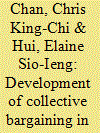

|
|
|
|
|
| Publication |
2014.
|
| Summary/Abstract |
2010 was a turbulent year for labour relations in China. The wave of strikes sparked by the Honda workers has highlighted the urgent need for trade union reform and workplace collective bargaining. In response to this turbulence, the Chinese government has stepped up efforts to promote the practice of collective bargaining, which had been neglected under the existing "individual rights-based" labour regulatory framework. In the midst of rapid social and policy changes, this article aims to examine the effect of labour strikes on the development of collective bargaining in China. The authors argue that, driven by growing labour protests, the collective negotiation process in China is undergoing a transition, from "collective consultation as a formality," through a stage of "collective bargaining by riot," and towards "party state-led collective bargaining." This transition, however, is unlikely to reach the stage of "worker-led collective bargaining" in the near future.
|
|
|
|
|
|
|
|
|
|
|
|
|
|
|
|
| 4 |
ID:
125309
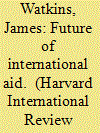

|
|
|
|
|
| Publication |
2013.
|
| Summary/Abstract |
By 2015, we will have nearly eradicated extreme poverty and hanger throughout the world by halving the proportion of people living on under $1.25 per day. We will have achieved universal primary education worldwide, reduced child mortality rates by two thirds, and halted and reversed the spread of HIV/AIDS, malaria and other diseases. We will have promoted gender equality, improved maternal health, and ensured environmental sustainability. Or at least, this is the promise that we made to ourselves, and to each other, almost 15 years ago.
|
|
|
|
|
|
|
|
|
|
|
|
|
|
|
|
| 5 |
ID:
124942
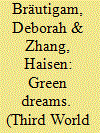

|
|
|
|
|
| Publication |
2013.
|
| Summary/Abstract |
What role does China play in the recent rush for land acquisition in Africa? Conventional wisdom suggests a large role for the Chinese government and its firms. Our research suggests the opposite. Land acquisitions by Chinese companies have so far been quite limited, and focused on production for African consumption. We trace the evolution of strategy and incentives for Chinese agricultural engagement in Africa, and examine more closely several of the more well known cases, sorting out the myths and the realities.
|
|
|
|
|
|
|
|
|
|
|
|
|
|
|
|
| 6 |
ID:
044272
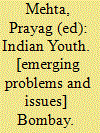

|
|
|
|
|
| Publication |
Bombay, Somaiya Publications, 1971.
|
| Description |
xii, 194p.
|
|
|
|
|
|
|
|
|
|
|
|
Copies: C:1/I:0,R:0,Q:0
Circulation
| Accession# | Call# | Current Location | Status | Policy | Location |
| 005710 | 305.0954/MEH 005710 | Main | On Shelf | General | |
|
|
|
|
| 7 |
ID:
130180
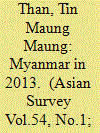

|
|
|
|
|
| Publication |
2014.
|
| Summary/Abstract |
The year 2013 in Myanmar saw parliaments disagreeing with the executive. A joint parliamentary committee to review and amend the Constitution was formed. Western sanctions were virtually withdrawn. A resurgence of communal violence, the emergence of Buddhist nationalism, and public protest over mega-projects, land rights, wage disputes, and freedom to demonstrate were worrisome developments. A nationwide ceasefire agreement remained elusive.
|
|
|
|
|
|
|
|
|
|
|
|
|
|
|
|
| 8 |
ID:
085809


|
|
|
|
|
| Publication |
2008.
|
| Summary/Abstract |
For almost three decades, I have had the privilege of observing the political, economic, soical and cultural changes in Germany. It was a period that was characterised by such terms as Mittelstreckenraketen (medium range missiles), pershing missiles, and the stationing of nuclear weapons on German soil. All this was accompanied by the NATO debate on the Doppelbeschluss, the double track decision put forward and championed by Helmut Schmidt.
|
|
|
|
|
|
|
|
|
|
|
|
|
|
|
|
| 9 |
ID:
089709
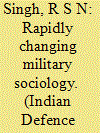

|
|
|
|
|
| Publication |
2009.
|
| Summary/Abstract |
The post-independence Indian Army continues to struggle with the British colonial model, ways and traditions, which served us well to a point. In fact, we were so enamored by the British ethos that we ceased to introspect of this land and its changing values demanded. More so, because, at least for four decades and my be even more, the changes in the country were slow, therefore imperceptible.
|
|
|
|
|
|
|
|
|
|
|
|
|
|
|
|
| 10 |
ID:
131902
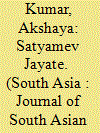

|
|
|
|
|
| Publication |
2014.
|
| Summary/Abstract |
Avatar
Film Star
Political Surplus
Truth
Entertainment
News
Crime
Cultural Economy
Moral Authority
Political Authority
Aamir Khan
Narrative Ingenuity
Politics
Social Changes
Trope
Social System
Social Reforms
|
|
|
|
|
|
|
|
|
|
|
|
|
|
|
|
| 11 |
ID:
164476
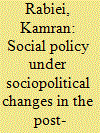

|
|
|
|
|
| Summary/Abstract |
The dialectic relation between sociocultural changes and political developments in the post-revolutionary Iran is discussed in the article which shows how the social policy of the governments has changed under this relation. The 1979 Islamic Revolution brought about a wave of tendency toward a specific discourse that can be called “downtrodden discourse” wherein the poor and deprived are the center of attention, and the resources of society are mainly mobilized in the direction of improving their economic and social conditions. Furthermore, the eight-year Iran–Iraq War (1980—1988) strengthened this discourse, and the new political system relied on the lower class of the society to push the war forward, stabilize the foundations of its power, and solidify its ideology. After the war, Iran had three governments with three different approaches toward social policy. During the era of Hashemi Rafsanjani (1989–1997), no special attention was paid to social policy since economic growth and development was the focus of the government activity. Under Mohammed Khatami (1997–2005), special attention was paid to comprehensive social policy, but due to internal political and social tensions, his government failed to implement its codified social policy. Although Ahmadinejad (2005–2013) intended to pay special attention to social policy, the actions taken by his government not only failed to reduce poverty but they also pushed the significant part of the middle class below the poverty line.
|
|
|
|
|
|
|
|
|
|
|
|
|
|
|
|
| 12 |
ID:
124295
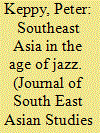

|
|
|
|
|
| Publication |
2013.
|
| Summary/Abstract |
Referencing insights from Cultural Studies and taking a jazz-age perspective, this essay aims to historicise and 'locate the popular' in colonial Indonesia and the Philippines. A new cultural era dawned in the 1920s urban hubs of Southeast Asia, associated with the creation of novel forms of vernacular literature, theatre, music and their consumption via the print press, gramophone, radio broadcasting and cinema. By investigating the complex relationship between the elusive phenomena of modernity, cosmopolitanism and nationalism as articulated by two pioneering artists active in commercial music and theatre, the social significance of popular culture is scrutinised.
|
|
|
|
|
|
|
|
|
|
|
|
|
|
|
|
| 13 |
ID:
122679


|
|
|
|
|
| Publication |
2012.
|
| Summary/Abstract |
The Arab awakening has started a process of changes that will extended well beyond 2011. Demands for political change will continue in all countries in the region, though change will come at the different pace across North Africa and Middle East and Arabian Peninsula, according to the specific conditions in each country.
|
|
|
|
|
|
|
|
|
|
|
|
|
|
|
|
| 14 |
ID:
124431


|
|
|
|
|
| Publication |
2013.
|
| Summary/Abstract |
Actor-network theory, material semiotics, the sociology of translation… The precise name of the domain in question is not itself entirely stable, and rightly so. In the ANT scheme of things, society is far less stable, representation and governance considerably more disputed, and order quite a bit more precarious, than most other frameworks would allow. Flux and impermanence are minor and tangled threads running throughout the history of the Western political imaginary: from Heraclitus and Lucretius to Nietzsche and Deleuze. No other research framework has married this minor current with empirical inquiry in a manner that is as thorough, practical, and relentlessly materialist as ANT. Bringing the Heraclitean worldview down to earth is one of its foremost accomplishments.
|
|
|
|
|
|
|
|
|
|
|
|
|
|
|
|
| 15 |
ID:
126643
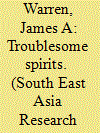

|
|
|
|
|
| Publication |
2013.
|
| Summary/Abstract |
Although alcohol has long been a feature of Thai society, historical evidence indicates that excessive drinking on a regular basis is a relatively recent phenomenon. During the nineteenth century, there were significant quantitative and qualitative changes in both alcohol consumption and production in Siam, due largely to the introduction of new alcoholic beverages and methods of distillation by Chinese immigrants and Western entrepreneurs. As public drunkenness became more common, excessive drinking was blamed for an apparent increase in violent crime throughout the kingdom. This paper examines how the Thai government tried to manage the upsurge in drunken behaviour and the obstacles it faced in doing so. Most of these problems stemmed from the limits on the kingdom's fiscal and judicial sovereignty imposed by the unequal treaties it had signed with the Western imperial powers; as such, they are indicative of Siam's semi-colonial status during this period.
|
|
|
|
|
|
|
|
|
|
|
|
|
|
|
|
|
|
|
|
|